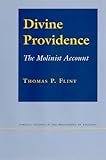Divine Providence : The Molinist Account / Thomas P. Flint.
Material type: TextSeries: Cornell Studies in the Philosophy of ReligionPublisher: Ithaca, NY : Cornell University Press, [2018]Copyright date: ©2006Description: 1 online resource (276 p.) : 5 figuresContent type:
TextSeries: Cornell Studies in the Philosophy of ReligionPublisher: Ithaca, NY : Cornell University Press, [2018]Copyright date: ©2006Description: 1 online resource (276 p.) : 5 figuresContent type: - 9781501711855
- Molinism
- Providence and government of God -- Christianity -- History of doctrines -- 16th century
- Philosophy
- Religious Studies
- PHILOSOPHY / Religious
- Catholic doctrines
- Jesuit theologian
- Luis de Molina
- Molinism
- Molinist metaphysical perspective
- Molinist
- Philosophical Review
- ReasonableFaith.org
- catholic theology
- christian history
- determinism
- divine providence
- metaphysics of theism
- metaphysics
- middle knowledge
- moral philosophy
- papal infallibility
- philosopher of religion
- philosophical theology
- philosophy of religion
- philosophy texts
- providence and predestination
- religious studies
- studies in philosophy
- studying religious philosophy
- theology
- 231/.5 23
- BT135 .F57 1998eb
- online - DeGruyter
| Item type | Current library | Call number | URL | Status | Notes | Barcode | |
|---|---|---|---|---|---|---|---|
 eBook
eBook
|
Biblioteca "Angelicum" Pont. Univ. S.Tommaso d'Aquino Nuvola online | online - DeGruyter (Browse shelf(Opens below)) | Online access | Not for loan (Accesso limitato) | Accesso per gli utenti autorizzati / Access for authorized users | (dgr)9781501711855 |
Browsing Biblioteca "Angelicum" Pont. Univ. S.Tommaso d'Aquino shelves, Shelving location: Nuvola online Close shelf browser (Hides shelf browser)

|

|

|

|

|

|

|
||
| online - DeGruyter Fictions of State : Culture and Credit in Britain, 1694–1994 / | online - DeGruyter Feminism and Suffrage : The Emergence of an Independent Women's Movement in America, 1848–1869 / | online - DeGruyter How Our Lives Become Stories : Making Selves / | online - DeGruyter Divine Providence : The Molinist Account / | online - DeGruyter Symphonia : A Critical Edition of the "Symphonia Armonie Celestium Revelationum" (Symphony of the Harmony of Celestial Revelations) / | online - DeGruyter Farming the Home Place : A Japanese Community in California, 1919–1982 / | online - DeGruyter The Currency of Ideas : Monetary Politics in the European Union / |
Frontmatter -- Contents -- Acknowledgments -- Introduction -- PART l. AN EXPLICATION OF THE MOLINIST ACCOUNT -- 1. The Twin Bases of Molinism: Providence and Freedom -- 2. The Molinist Account of Providence -- PART II. A DEFENSE OF THE MOLINIST ACCOUNT -- 3. Alternative Accounts of Providence -- 4. Five Thomistic Objections to Molinism -- 5. The "Grounding" Objection to Middle Knowledge -- 6. Hasker's Attack on Middle Knowledge -- 7. Adams and Vicious Circle Arguments -- PART III. SOME APPLICATIONS OF THE MOLINIST ACCOUNT -- 8. Papal lnfallibility -- 9. Prophecy -- 10. Unanswered Prayers -- 11. Praying for Things to Have Happened -- Conclusion -- Index
restricted access online access with authorization star
http://purl.org/coar/access_right/c_16ec
Thomas P. Flint develops and defends the idea of divine providence sketched by Luis de Molina, the sixteenth-century Jesuit theologian. The Molinist account of divine providence reconciles two claims long thought to be incompatible: that God is the all-knowing governor of the universe and that individual freedom can prevail only in a universe free of absolute determinism. The Molinist concept of middle knowledge holds that God knows, though he has no control over, truths about how any individual would freely choose to act in any situation, even if the person never encounters that situation. Given such knowledge, God can be truly providential while leaving his creatures genuinely free. Divine Providence is by far the most detailed and extensive presentation of the Molinist view ever written.Middle knowledge is hotly debated in philosophical theology, and the controversy spills over into metaphysics and moral philosophy as well. Flint ably defends the concept against its most influential contemporary critics, and shows its importance to Christian practice. With particular originality and sophistication, he applies Molinism to such aspects of providence as prayer, prophecy, and the notion of papal infallibility, teasing out the full range of implications for traditional Christianity.
Mode of access: Internet via World Wide Web.
In English.
Description based on online resource; title from PDF title page (publisher's Web site, viewed 26. Apr 2024)


